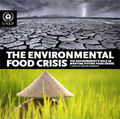17 February 2009: Unless action is taken, 25 percent of the world’s food production may be lost by 2050 due to environmental breakdown, according to a UNEP report released during the 25th session of the UNEP Governing Council/Global Ministerial Environment Forum, which is convening from 16-20 February 2009, in Nairobi, Kenya.
The report, titled “The […]

17 February 2009: Unless action is taken, 25 percent of the world’s food production may be lost by 2050 due to environmental breakdown, according to a UNEP report released during the 25th session of the UNEP Governing Council/Global Ministerial Environment Forum, which is convening from 16-20 February 2009, in Nairobi, Kenya.
The report, titled “The Environmental Food Crisis: The Environment’s Role in Averting Future Food Crises,” provides an overview of how environmental stresses such as climate change, water stress, invasive pests and land degradation may impact food prices and world food security, and proposes a seven-point plan to reduce the risk of hunger and rising food insecurity in the 21st century.
The report’s main findings include: food prices may increase 30-50 percent within decades with severe impacts for the rural poor; many factors blamed for the current food crisis, including drought, biofuels, high oil prices, low grain stocks and speculation, may worsen substantially in the coming decades; and climate change emerges as a key factor undermining food security. The report presents seven options for improving food security for the short-, mid- and long-term. Short-term effect options include: decreasing the risk of volatile food prices through measures, such as price regulation, buffer cereal stocks and food safety nets; and removing subsidies and blending mandates for first generation biofuels. Options with mid-term effects include: reducing the use of cereals and food fish as animal feed and increasing food energy efficiency; supporting diversified and resilient eco-agriculture systems; and increasing trade and improving market access. Options with long-term effects include: limiting global warming, including through the promotion of climate-friendly agricultural production systems; and raising awareness of pressures from increasing population and consumption patterns on ecosystem functioning. [UNEP Press Release] [UN Press Release] [The Report (PDF or e-book)]